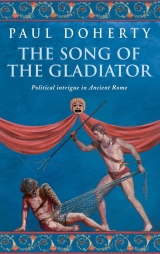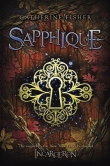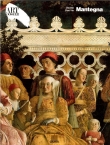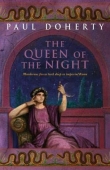
Текст книги "The Song of the Gladiator"
Автор книги: Paul Doherty
Жанр:
Исторические детективы
сообщить о нарушении
Текущая страница: 7 (всего у книги 18 страниц)
Claudia listened intently, drawn by the power of Athanasius’s oratory as well as by his critical scholarship, which was making a deep impression on his audience. Even Constantine was listening carefully, whilst Helena was tapping her foot, a common gesture when she was pleased. Claudia studied the faces around her. She glimpsed Gaius Tullius, eyes closed in concentration, Timothaeus beaming with pride, whilst beside him Sylvester nodded in agreement. She wanted to stay and listen but decided this was the best time to visit the scene of Dionysius’s murder. She slipped away from the crowd, along a warren of passageways and out through the garden into the orchard beyond. She entered the trees and noticed scuff marks on the ground, but she couldn’t decide if these had anything to do with the murder or were the traces of those who found the corpse.
When she reached the place where the philosopher had died, the grass was dark-stained with blood, above which flies buzzed. In the branches overhead a bullfinch chirped noisily as if resentful of her presence. Claudia crouched down on her hands and knees, scrutinising the ground carefully. She found the small holes where the pegs had been driven in and could trace a faint outline of how the corpse had lain.
‘So you died here,’ she murmured to herself.
She retraced her steps, examining the ground carefully, until she reached an apple tree. The ground beneath it also bore marks of blood, and some distance away lay a moss-covered stone. She picked this up; it was heavy, yet she could carry it out into the pool of sunlight near a small bed of flowers. She placed the stone on the ground, running her fingers over it. The lichen had been disturbed, and she found traces of blood and a few hairs. Claudia squatted on the ground and stared at the apple tree.
‘So, Dionysius,’ she whispered. ‘You were sitting there, meditating or sleeping. Your assassin comes creeping like a shadow. You are stunned with a blow to the head from this stone.’ She rose to her feet. ‘Then you’re dragged deeper into the trees to be murdered.’
Claudia walked lightly forward. She made a slight noise, so she took off her sandals and found that she could move silently across the grass. Satisfied that she had learnt all she could, she moved into an adjoining garden and across the lawn to the burnt-out remains of the House of Mourning, now reduced to a pile of blackened rubble. Near by, a slave squatted on the ground, staring dolefully at the ruins.
‘What are you doing here?’ Claudia asked.
‘The Captain of the Guard told me to stay here until he has examined the ruins more carefully, but there’s nothing to examine.’
The man was narrow-faced, his cheeks and chin unshaven. He plucked at a loose thread on his dirty gown.
‘I hope they don’t blame me,’ he moaned. ‘That was my duty, you know, to watch the dead, to keep the House of Mourning clean and generally look after things.’
Claudia sat down next to him.
‘What happened?’ she asked. ‘Tell me precisely, not about the old man’s corpse but the one who was murdered in the orchard.’
‘Oh, he was a proper mess,’ the slave replied. ‘The Captain of the Guard brought his corpse in and told me to wash it. There was a terrible wound,’ he patted the left side of his head, ‘while his body was sliced, arms, legs and chest, even the soles of his feet. He must have died in great pain. His eyes were still open, and that awful gag in his mouth, a piece of leather used to keep a door open.’
‘And the bonds?’ Claudia asked. ‘The ropes,’ she explained, ‘used to bind the victim’s hand and feet?’
‘They were still attached to his wrists and ankles, tied very tightly they were. I had to slice them with a knife.’
‘And what did you do with them?’
‘I threw them on the floor. You see, mistress, I was getting hungry, and when you’ve washed one corpse, well, you can only take so much in one day. I didn’t want to miss my ration so I thought I would finish him this morning.’ The fellow rubbed his stomach. ‘Of course, we were being fed scraps from the kitchen, so I ate well and went to sleep. The next thing I know the House of Mourning is burning.’
Claudia gave him a coin from her purse, then she rose and walked across to the blackened remains of the mortuary. She was still carrying her sandals, so she put these on and stepped on to the smouldering stretch of ash. The building had been completely destroyed, timbers and stones mixed together, covered in a fine white dust and blackened ash. She had to step carefully among the rubble. Eventually she crouched down and, using her dagger, sifted through the debris. She caught the faint smell of oil and a strange sickly sweetness. The two corpses must have been consumed totally by the fire, along with everything else the House of Mourning contained.
She left the building, the slave watching her curiously as she walked its circumference. The fire had been quite self-contained, because the House of Mourning stood on a plinth of stone well away from the garden. The grass around was scorched, but Claudia could detect no sign that the fire had been started by a flickering brand or a pot of burning oil hastily thrown in. She entered the ruins again, and this time the slave came over to help her move charred bricks and pieces of timber, yet there was still nothing to be found.
Claudia thanked the man and went across to the gardens and into a small shaded portico, erected so imperial residents could shelter from the sun. On the breeze she heard the sound of voices, occasional clapping, and she realised the debate must still be going on. She lay down on the grass, staring up through the gaps in the portico’s roof at the blue sky, scored by the occasional white wisp of cloud. She and Felix used to love doing this; when she was by herself, Claudia almost felt as if her brother had returned and was stretched out beside her, eyes watching her devotedly, wondering what his beloved elder sister would plan next. She blinked away the tears and concentrated on the mysteries at the Villa Pulchra. She had no explanation for the sword which had disappeared, whilst as for Dionysius’s death, there were a number of theories for the motive in a villa packed with suspects. Beneath the polished façade of this elegant country estate swirled deep, dark passions as old memories and grudges surfaced. Yet what mystified Claudia most was the total destruction of the House of Mourning. She had, in the light of no other evidence, firmly concluded that the arson was not a further indignity against the hapless Dionysius; the assassin simply wished to destroy something which, if closely examined, might reveal his or her true identity. Claudia’s eyes grew heavy. She thought of returning to the debate, but within minutes was fast asleep.
When she started awake, she realised from the lengthening shadow of a nearby tree that she had been asleep for some time.
‘I’ve been watching you.’ Claudia whirled round. A shadowy figure emerged, half concealed by a tree trunk.
‘Who are you?’ Claudia tried to rise but tripped on her robe.
‘Here, let me help.’
She felt a hand grasp her arm and stared up at Athanasius, his eyes not so harsh now. She thanked him, a little embarrassed about her suspicions, as Athanasius brushed the blades of grass from her tunic.
‘I’m sorry if I startled you.’ Athanasius smiled. ‘I can see the debate had, at least, one good effect: you were fast asleep. After I deliver a speech, I always like to soothe my mind, cool the blood, so I go for a walk.’
‘Did you win?’ Claudia sat down on the grass, and Athanasius joined her.
‘Well, there wasn’t a vote.’ Athanasius chewed on his lip and stared at a point behind Claudia. He squinted. ‘No, there wasn’t a vote,’ he repeated, ‘but I think we made our point. Justin was unable to answer my authorities, the quotations from the scriptures. He became confused and rather garbled. I think we carried the day.’
‘Why did Dionysius offer to come over to your party?’
Athanasius shrugged. ‘Promotions, honours, wealth. He recognised the way the wind was blowing.’
‘So he could have been murdered by one of his own party?’
‘Or one of ours?’ Athanasius sniffed. ‘Religion is like politics, Claudia. We may all sing the same hymn but that doesn’t mean we like to be part of the choir. Dionysius might have provided us with information about possible traitors in our own ranks.’
‘Could he have been connected with the Lapsi?’
‘Ah!’ Athanasius smiled. ‘So you know all about that – I saw you whispering with the Augusta. I wondered where the information came from. No surprise that the Emperor issued his decree.’ He leaned forward, joining his hands as if in prayer. ‘You see, Claudia, the oratory school in Capua is quite famous. Many Christian families fled there eager to escape the persecution in Rome. When Diocletian launched his attack, Capua was especially singled out. The authorities moved spies and informants into the town. We suddenly received a new influx of would-be scholars, some of them genuine, others looking for mischief. By the way, I’m not saying you’re a spy.’
‘Oh, but you’re wrong, Magister.’ Claudia smiled. ‘I am a spy but not a traitor. There is a distinction.’
‘I don’t know what really happened,’ Athanasius continued. ‘We hid our sacred vessels away, and met at night in underground caverns or out in the countryside. We were safe, or thought we were, until all the demons of Hell were let loose. The raids grew more intense, more people were roped in. A troop of torturers arrived from Rome and the questioning began.’
‘Were you arrested?’
‘Yes, yes, I was. I was much younger then but I had powerful patrons and I had been taught my lesson well. If you are ever questioned, Claudia, do not remain silent but tell them a story, any story, as long as it holds together. I was released and fled before the real persecution began. Others were not so lucky. Some broke, some died under the torture, quite a number were dispatched to Rome to face a hideous death.’
‘And Dionysius?’ Claudia asked softly.
‘Dionysius was barely out of his teens, a recent convert; something like you, Claudia, a messenger, a man who travelled between the various groups. He would know the places and times. He too was released around the same time I was.’ Athanasius paused, clicking his tongue, and Claudia could see he was fighting back the tears. ‘Shortly afterwards the Roman authorities became, how can I put it, more fortunate in their searches. And the prisons overflowed with their Christian prisoners.’
‘Was Dionysius suspected of being an Iscariot, a traitor?’
‘We were all suspected, myself included. The nightmare of the situation is that dozens of people died gruesome deaths.’
‘So,’ Claudia replied slowly, ‘Dionysius could have been killed by his own party because they knew he was about to betray them. He could have been killed by one of your party because he was bringing information that might pose a threat. Or the killer could be someone else, settling scores for a relative or friend caught up in a savage persecution which began a decade ago.’
‘And what do you think?’
Claudia studied Athanasius’s clever, cynical face. Although she hadn’t liked him at first, she felt she could trust this man, who had, in his own way, an integrity, a passion for what he believed in.
‘Claudia?’ Athanasius waved a hand in front of her eyes.
‘I was thinking of passion.’ She laughed apologetically. ‘The person who killed Dionysius didn’t creep up behind him with a dagger or an axe or beat his brains out with a club. Dionysius was first stunned, then dragged into the trees, gagged, bound and tortured.’ She snapped her fingers. ‘Tell me, Athanasius,’ she continued hurriedly, ‘isn’t there a torture where the prisoner is hung in chains and death is inflicted by a thousand cuts?’
‘I’ve heard of such cruelty,’ Athanasius conceded. ‘I see the path you are following. You’ve answered your own question: was Dionysius murdered to satisfy a grudge which the killer had nursed since the great persecution?’
‘It’s possible.’ Claudia got to her feet and walked away. ‘If you ever learn anything new. .’ she called out over her shoulder.
‘You’ll be the first to know,’ Athanasius sang back.
Claudia felt refreshed after her sleep and decided to walk to the villa, hoping to meet the people she had secretly listed. She found Justin resting in a colonnaded walk, his disciple beside him. They were sharing a jug of wine, drowning their sorrows. They glanced up and welcomed her.
‘I understand you did very well.’ Claudia tried to put a smile on it.
‘In which case,’ Justin slurred, ‘you are the only person here who thinks that. Athanasius confused me. I thought his speech would be about the Divine substance.’
‘Yes, yes,’ Claudia intervened, ‘though I haven’t come to discuss your opponent but Dionysius. Did you know he was going to betray you?’
Justin glanced quickly at his companion. He was going to lie, then his shoulders drooped and he nodded. Claudia thought he was upset, but when he lifted his tired face, it was hatred that blazed in his eyes. You’ve been trapped and humiliated, Claudia reflected. You are a very dangerous man.
‘Dionysius,’ Justin spat the word out, ‘was a reed bending in the wind. We had our suspicions about him. He had become silent, withdrawn.’
‘And?’ Claudia asked.
‘We’d received reports that he had been seen visiting Athanasius’s house and frequenting his lectures. So he’s not going to be missed, is he? I have nothing more to say about his death.’ Justin turned away, picking up the wine jug to refill his goblet. The disciple sniffed and looked Claudia over from head to toe.
Claudia bit back her angry retort. As she turned away, Burrus and his cohort of mercenaries turned the corner and came swaggering along the colonnade. They always reminded her of a pack of shambling bears, with their thick beards and the furred cloaks they insisted on wearing whatever the heat. Despite the Empress’s instructions, they had all been drinking. Claudia walked towards them and held her ground, blocking their path. Burrus stopped so suddenly his followers pushed and shoved into each other. They immediately ringed her. Claudia stared around; light blue eyes in scarred weathered faces gazed back. She could smell the grease and oil they rubbed on their bodies, as well as the perfume they sprinkled in a fruitless attempt to disguise it; they always reeked of the bear pit and the stable.
The Germans smiled benevolently down at her, either tapping the hilts of their swords or combing their beards and moustaches with their fingers, a common gesture whenever they were assessing the worth of a woman. Claudia smiled sweetly at them. They grunted and bowed back. They liked this little one, the Empress’s mouse. They had seen the Augusta stroke her hair, and that was good enough for them. They also knew about Murranus, and concluded that such a man must have a shield-maiden with a warrior’s heart. For her part, Claudia was not fooled by their bluster and comical ways; these men were killers, noted for their savagery and cunning. They had proved time and again how their coarse, rough appearance masked minds as sharp and keen as any sword. They also liked to help themselves to whatever was available, and this included women. They shuffled and moved around her. Claudia could see one or two trying to shelter behind the others; a rare event, because usually each warrior liked to be seen. She walked towards the two who were hiding, gesturing with her hand for the others to move aside. At first they stood their ground.
‘Please.’ Claudia smiled. They obeyed. She confronted the two she thought of as the Sulkers, who stood, hands hanging down, glancing fearfully at her from under their eyebrows. She noticed the slight bulge in both their tunics which they only drew attention to by trying to pull their cloaks over. ‘Please,’ Claudia demanded, stretching out a hand, ‘let me see what you have.’
The Sulkers shuffled their feet; Claudia snapped her fingers. The Sulkers shrugged, threw back their cloaks, and pulled up tunics to reveal hairy stomachs. Each drew out a beautiful ivory statue of the goddess Juno, dressed in the Greek fashion, standing upon a small hillock with a rose bush entwined around her ankles, in one hand a rod of lightning, in the other a cluster of grapes. Claudia balanced both figurines in her hands and stared round the group. Burrus gazed at her open-mouthed. The rest were staring up at the sky as if they were seeing it for the first time. The two Sulkers sank to their knees and put their faces in their hands, a gesture of their tribe, a plea for mercy.
‘What is this? What is this?’ The mercenaries stood aside as Gaius Tullius and a group of household officers came walking along the colonnade. They were not dressed in uniform but wore plain tunics over rather baggy breeches, sandal boots on their feet. Gaius carried a sword belt over his shoulder. The mercenaries became alarmed. There was little love between the regular army and what they scornfully termed the ‘auxiliaries’. ‘What is this?’ Gaius repeated, forcing his way through the throng, his handsome face all tense, eyes watchful.
Claudia heard the scrape of steel as his companions drew their swords. One of the mercenaries, fearful of what was to happen, went for the dagger thrust in his belt, but Gaius smacked his hand away.
‘You have no authority to draw your swords here. Claudia?’ Gaius turned and stared down at the figurines she was holding. ‘I see.’ He took one of the statues out of her hands, turned and pushed it under Burrus’s nose. ‘Shall I tell you the penalty for theft from an imperial palace? Forty-nine lashes of the whip and possible crucifixion. I want the culprits!’
‘Captain, Captain.’
Gaius turned.
‘Yes, Claudia?’
‘I think you’ve made a mistake.’ Claudia deliberately spoke slowly so the Germans would understand her and not intervene. ‘These gentlemen were on patrol in the grounds. They found these figurines peeping out from beneath a bush, picked them up and brought them to me so I could find their rightful owner.’
‘Could you show me this bush?’
‘Captain,’ Claudia fluttered her eyelids, ‘you’re not trying to say I’m a liar? After all, you have the proof. I was holding the figurines, not them. And I certainly haven’t stolen them. I can prove my movements this morning. But if. .’
‘Of course,’ Gaius replied hastily. He turned and slapped Burrus’s shoulder. ‘You are,’ he said, ‘the most fortunate of men.’ The escorts sheathed their swords, and Gaius bowed and walked away.
Once they were out of sight, the Germans crowded in round Claudia. She was squeezed and hugged, lifted up and kissed on each cheek. She felt as if she had been taken over by a very friendly family of bears. The Germans grunted with pleasure. Some were laughing quietly, trying to hide their mirth, though the tears streamed down their cheeks. Burrus grabbed her by the shoulder and led her out of the colonnade and into the shadow of some very gnarled olive trees, part of an ancient grove included in the gardens when the villa was first built. Once they were away from the public gaze, he stood, hands on Claudia’s shoulders, beaming down at her. Then he spoke rapidly in German over his shoulder. The two Sulkers came forward one at a time, and each knelt at Claudia’s feet and, taking her hands, clasped them while they recited some oath, faces all solemn, eyes gleaming.
‘They are now yours,’ Burrus translated, ‘in peace and war. Blood and fire will be no deterrent. You’ve just acquired two brothers, Claudia.’
She stared down at these new additions to her family, smiled and whispered her thanks. Once again the horde closed in for further communal squeezing. Claudia, breathless and feeling rather bruised, thrust the figurines into Burrus’s hands.
‘For the love of life,’ she swore an oath Burrus used, ‘take these bloody things back to where you found them and never, never do that again.’ She held his gaze. ‘Now you can do me a favour. I want you to come to the cellar where the Holy Sword hung.’
They all followed her obediently along the colonnade, out across the gardens, through the peristyle court and down the steps leading to the cellar. At the bottom they would go no further but stood like children chattering amongst themselves. Burrus explained they still regarded the cellar as a sacred precinct haunted by Christian spirits.
‘Very well,’ Claudia sighed. ‘The rest of you brutes go back to the peristyle. Burrus, I want the two guards who were on duty the day the sword disappeared.’ Burrus rapped out orders. For a while there was confusion. The Germans didn’t really want to leave; they were quite fascinated by this wily little creature with the face of one of their wood elves who had managed to trick a powerful officer and so rescue two of their comrades. Nevertheless, after Burrus had shouted and slapped a few, they shuffled back up the steps. Claudia was not surprised that the two guards left were the Sulkers. They stood looking rather embarrassed, one staring at the wall as if fascinated by the brickwork, the other gazing at the floor as if he had lost something precious.
‘Burrus,’ Claudia tugged at the mercenary’s cloak, ‘did you take the sword?’
He replied in a flurry of oaths, which his companions repeated.
‘Very well,’ Claudia declared. ‘Show me what happened that day.’
The two guards took up position either side of the door, squatting down on their haunches. Burrus showed how Timothaeus had inserted his key and so had he.
‘And you’re sure the door was locked?’ Claudia asked.
Burrus grunted a yes.
‘Now the door swings open.’ Claudia noticed the two Sulkers didn’t move, but Burrus jumped away as if someone was lurking in the darkness beyond. She went inside, and heard the door close behind her. She opened it and went back outside.
‘Are you sure that happened? I mean, the door was closed?’
Burrus agreed.
‘Did Timothaeus carry a lamp?’
‘Oh yes,’ the German retorted, using his hands to describe it. ‘One of those lantern horns.’
‘I see. Fetch me one.’
The mercenary Captain hurried off and came back with a large lantern horn, its frame made of bronze, the four sides hard sheets of polished vellum. Claudia opened the latch; inside, an oil lamp was fixed to the centre. One of the guards brought a tinder, the lamp was lit and Claudia returned to the cellar. She picked up one of the stools, sat by the edge of the circle of sand and stared up at the empty hook. She closed her eyes. Timothaeus came in here, she thought, he fainted. She opened her eyes and dug her hand deep in the sand. What had happened? How had that sword disappeared?
‘Burrus,’ she called. The German wouldn’t answer, so Claudia went out. She asked if the cellar had been thoroughly searched after the theft. Burrus nodded.
‘I think so, but it was obvious the sword had gone.’
‘But had it?’ Claudia asked. Whilst sitting in the cellar, the seed of a new idea had taken root.








